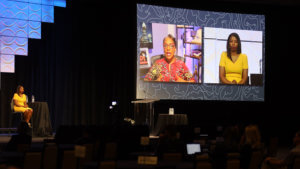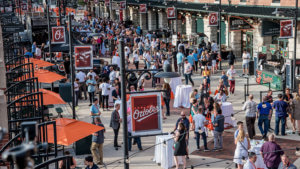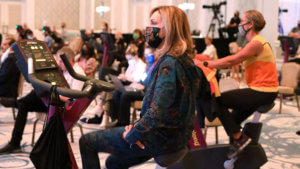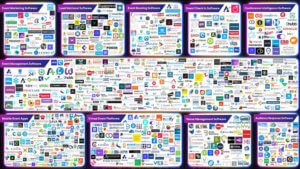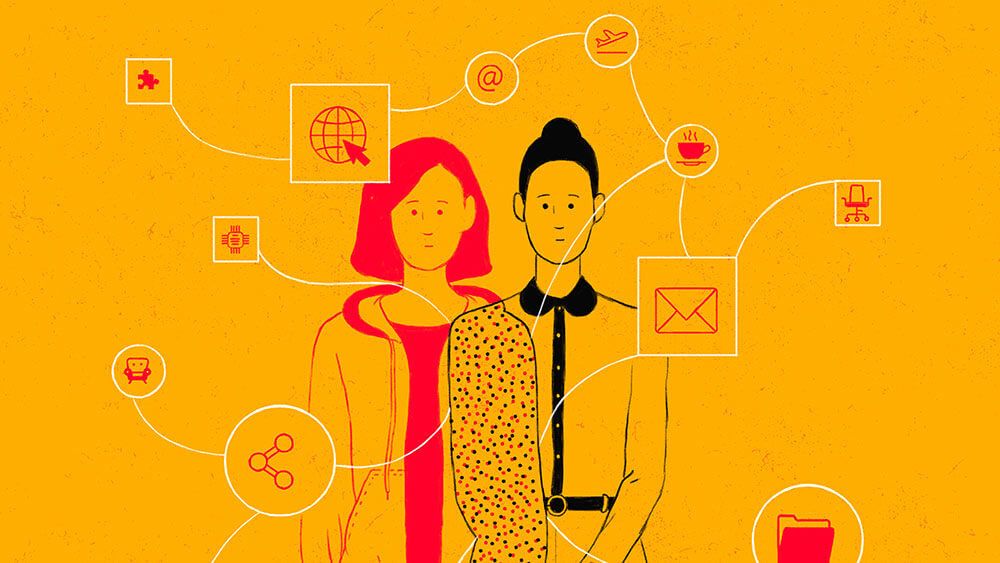
None of the experts Convene spoke with advised that event organizers should go back to business as usual circa 2019. (Daniel Liévano)
The pandemic isn’t over, but the days of empty airplanes and terminals you could roll a bowling ball through without striking a single traveler were ending earlier this summer at some destinations. Leisure travel was coming back with such a vengeance that it was being called “revenge” travel — as if we are getting back at COVID? And even business travel, which had been expected to lag behind, was inching back. In fact, organizers of events planned for this fall were reporting registration numbers comparable to pre-pandemic levels. Ticket sales for the medical conference HLTH, to be held in Boston in October, were in line with what they had been in 2019 and sponsorships were selling out, Jon Weiner, HLTH’s founder and CEO, told Bloomberg News in mid-July. And Ash Noah, vice president of the Association of International Certified Professional Accountants, told Bloomberg that “there has been an underestimation of the bounce back” in corporate travel in the service industry. The media outlet described fall conferences as having a “pre-pandemic flavor.”
Liz Caruso, founder and CEO of the techsytalk conference and community, is familiar with the urge to go back to the world the way it was before the pandemic. “A lot of corporate planners are talking about going back to in-person and hearing from their teams and their bosses that virtual meetings were almost like a blip on the radar,” Caruso said on July 13, speaking as a digital panelist at Hybrid Events Ignited, which was held at venues in London and New York City and online. She said that the thinking is, “‘We did virtual because we had to — and now we go back to in person only.’ I think that’s a big mistake.”
The last year has shaken up the events industry in a way that was “very much needed,” said Caruso, who’s been an advocate for event technology for more than decade. “I think organizers have been stuck in the way they have always done things. The concepts have been around for a long time, and other industries have been using digital tools for a long time.” Planners might be able to get away with ignoring the transformation going on around them for a few years, “but they won’t remain competitive,” she added.
“Evolve or die,” is Caruso’s mantra. “The world has evolved, and whether your company has evolved doesn’t matter,” she said. “In the last year, human behavior has changed dramatically.”
Convene asked individuals from inside and outside the business events industry to talk to us about behaviors and other changes brought on by the pandemic that are lasting, and in particular, to share which ones they think are likely to transform events. We offer their insights and opinions in the stories we link to below.
None of them advised going back to business as usual circa 2019. “I think it’s really, really critical that event organizers push themselves to do things that are uncomfortable in this moment,” Caruso said in her session. “Ask yourself: ‘What do events look like that can achieve all our goals, in person and digital? What can we be doing now to transform all the work we’ve been doing for years and help us provide more value?’”
As neuroscience expert Sara Ross, founder of BrainAMPED research group, said in another context: “We’re already in change mode — so why not keep changing?” (See “When We Meet Again.”)
Earn CMP Credit
This article and those below are part of the cover story for the July-August issue of Convene and of our CMP Series. Earn one clock hour of certification by visiting pcma.org/convene-cmp-series to answer questions about information contained in these articles. The Certified Meeting Professional (CMP) is a registered trademark of the Events Industry Council.
9 Questions for Event Professionals to Ponder
Innovation expert and questionologist Warren Berger offers a list of questions event organizers should weigh while planning their upcoming events in a new world.
Four Views on How the Pandemic Will Change How We Meet
One thing is clear: The pandemic demanded that we think deeply about how — and where — we meet. Four events industry experts weigh in on lessons learned and where we’re headed.
Post-pandemic Event Contracts
How may the pandemic affect event contracts in the long term? Here’s one legal view.
‘Employees Have Become a Company’s Most Valuable Asset’
The rise of human capital as a company’s single-most important asset for value creation has been happening for decades, but the pandemic has helped us see that putting human capital first is just good business.
When the Whole World Gets Sick, What Does That Mean for Wellness?
Here’s what the future of wellness, health, and safety looks like from the perspectives of experts in two different fields.
More Contactless Technology — But More Social Interaction
Three hospitality executives share short- and long-term views of what is happening next for hotels.
A Change of Fashion
Fashion changed when people stopped going out, and not just because we were all wearing sneakers and sweatpants. A professor from the Fashion Institute of Technology provides an analysis of what that means for the fashion business and fashion-focused events.
Has the Pandemic Changed How Planners Think?
Event technology has exploded over the last year — here are two views on what new tools will mean for planners in the future.
Shining a Light on Public Spaces
Indoor and outdoor public spaces have become only more valuable to us after the pandemic — and flexibility in both environments has become more critical. Two experts share why.
The Push to Digital Gave Trade Shows a New Business Model
No matter what their customer base, every trade show should now be based on creating valuable content, argues trade-show expert Francis Friedman.

